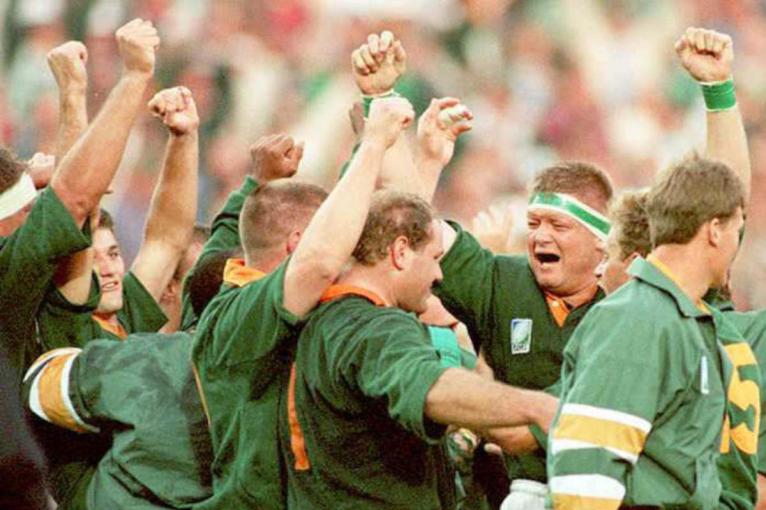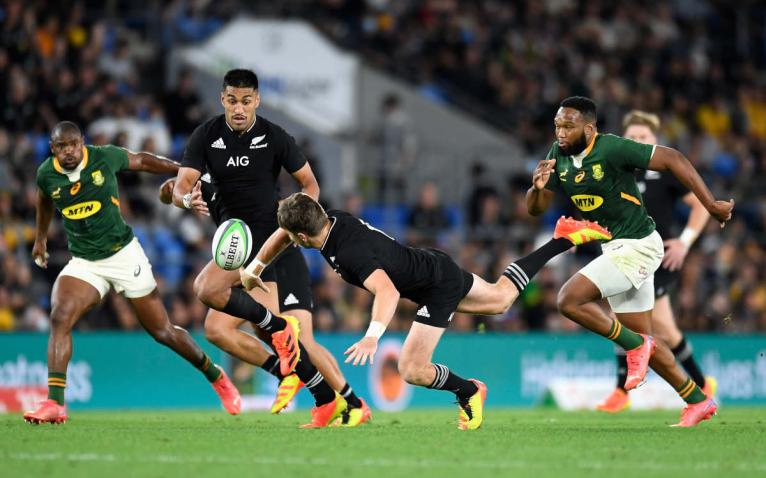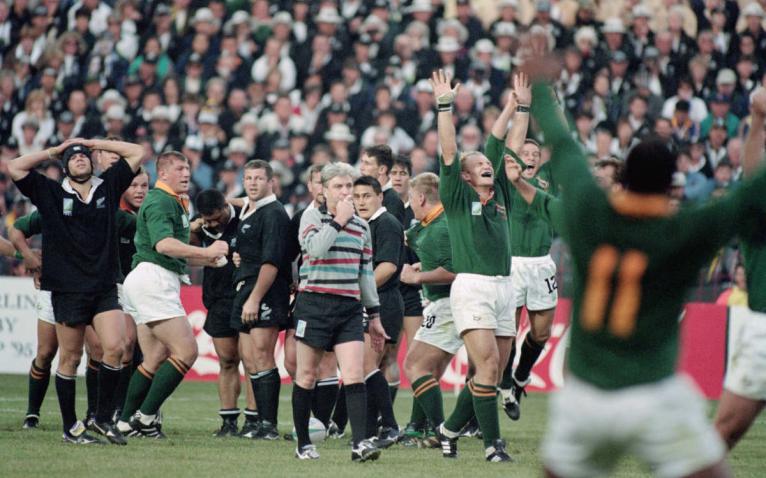There are thousands of different versions of the Boogeyman around the world. In Slavic countries it’s the witch Baba Yaga who flies around on a mortar, wielding a pestle as she eats stolen children. In Latin America it’s the chupacabra, a sharp-toothed demon monster that drinks the blood of its victims. But for South Africans of a certain age, the source of nightmares took on a more human form.
Officially 1.95m tall and weighing 125kgs, this colossus seemed to expand beyond his corporeal form. He moved with all the menace of a great wildebeest stampede and collecting debris in his wake like a category five storm. In a different time, in a different place, he would have passed into legend under the guise of many names. History will remember him as Jonah Tali Lomu.
“He was obviously incredible,” says Kobus Wiese, South Africa’s World Cup winning lock who was one of 18 heroes in green and gold who stood firm against the black tide of Lomu’s All Blacks 28 years ago. “But he wasn’t the only threat. Anyone who plays for the All Blacks presents a challenge.”
Wiese met that challenge the only way he knew how; leaning towards it on the front foot. Before the showpiece event in Johannesburg that would culminate in Nelson Mandela handing Francois Pienaar the Webb Ellis Cup, the All Blacks assembled for the haka.

“I’ve always loved the Haka,” Wiese adds. “It’s so special, not just for New Zealand rugby but for world rugby. I hate it when fans boo or whistle or sing over it. I hate it even more when opposition players turn their back on it. Luckily that doesn’t happen anymore but before the game one of our players, some smart arse, I won’t say who, suggested we ignore the haka because he said it was demonic, which is a load of crap.
“We decided we’d face it and get as close as we could to it, to show we weren’t afraid of it. But I never thought I’d get so close. When they started to move forward we moved forward. Eventually me and Jonah were eyeball to eyeball, centimetres apart. I’ll never forget that moment. It was iconic and will stay with me forever.”
One word that Wiese repeats throughout our conversation is “respect” and it’s one that has been used throughout the build up. Beauden Barrett, who is the third highest points scorer in the contest behind Dan Carter and Andrew Mehrtens, echoed this sentiment when he spoke with BBC Sport this week.
“The mutual respect we have for one another, the history that goes back for decades, there’s just something about it,” Barrett said. “One thing we have in common is we play hard and truly appreciate a beer with one another off the field. We can truly beat each other up but have a hand shake and enjoy each other’s company. You can’t say that about every team.”
It’s the greatest rivalry in the sport and one that stretches back to 1921 encompassing 105 Tests. South Africa and New Zealand, two former British colonial outposts on the periphery of the world map, have reached punched above their weight on the rugby pitch. With three World Cup crowns apiece, they are the undisputed kings of the oval ball. Now, in the final that has the potential to eclipse all that has come before, they have a chance of stepping onto the top tier of the podium on their own.

New Zealand, as they do against every other country, have the edge in this relationship. With 62 wins to South Africa’s 39, including four draws, one might assume it’s a largely one-sided affair. This is largely a consequence of the Richie McCaw era as well as a run of eight consecutive wins between July 2001 and August 2004. But before the game turned professional after the 1995 World Cup, the contest had a more equitable feel to it.
New Zealand won the first Test 13-5 in Dunedin in 1921 but South Africa won the second in Auckland 9-5. Eight of the next 12 went the way of the Boks and the pair exchanged blows more or less in an even manner until 1981. By this time South Africa had become a pariah state as a consequence of the racist apartheid regime but New Zealand kept ties with their favourite frenemy.
The relationship became untenable during South Africa’s tour to New Zealand in 1981 when anti-apartheid protestors disrupted matches, famously invading the pitch in Auckland while a low-flying plane dropped flour-bombs on the field. Consequently, New Zealand joined the rest of the world in turning its back on South Africa.
After Mandela’s release from 27 years in prison in 1990, reparations on the sports field could begin and the rivalry resumed in 1992. Fittingly the reunion took place at Ellis Park where the All Blacks edged a thriller 27-23.
“Even with everything else that was going on, the All Blacks remained the pinnacle,” Wiese says, recalling being woken up by his father at three in the morning to listen to the radio broadcast of South Africa’s tour to New Zealand in 1970. Six years later he got to see them in the flesh as he took part in an under-11 curtain raiser in Upington as greats like Bryan Williams, Sid Going and Take Norton took the field.
“I told my mom, ‘These guys are something else’,” Wiese continues. “I think it was the all black kit. They had this aura about this. It was clear to me even at that age that this one meant more. Sean Fitzpatrick once told me that All Blacks don’t consider themselves true All Blacks until they’ve played the Springboks. I can tell you, we feel the same way.

“That World Cup final was my first match against them so it was extra special. Yes it was a World Cup final so I would have been ready to take on anyone. But because it was the All Blacks it reached a different level.”
John Smit, South Africa’s World Cup winning captain from 2007, supported this claim when he said this week, “I always talk about how you get two debuts; the first time you play for South Africa and then obviously the first time you face the haka.”
At the risk of speaking for all South African supporters, the feeling is shared across the ecosystem. There is simply nothing like it. It is a narrative woven with classic matches and political intrigue. One that unites “frontier-type societies”, as the former Springboks captain Bobby Skinstad put it, and provides two relatively diminutive nations a chance to ascend to the top of the world. For Springboks fans and those who represent them, there is no greater challenge.


World Cup final result
SA 20 - NZL -19
Nice article.
Brilliant article! However, I wouldn’t call South Africa a ‘relatively diminutive nation’ - especially in terms of population, land mass and playing numbers (when compared to New Zealand).